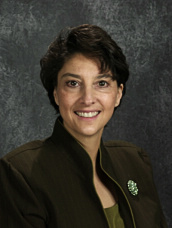
A Conversation With Maria C. Rice, Superintendant, New Paltz School District
By Ray Smith
From Issue 12: Fall 2011
Legislation passed in May mandates a phased-in, statewide evaluation of teachers and principals. These comprehensive evaluations will generate a single effectiveness score for each teacher or principal, 40% of which will be determined by student achievement measures. That score will become a significant factor in promotion, retention, tenure determination, termination and supplemental compensation decisions.
I emailed Mrs. Rice seeking an interview. She promptly responded that she’d be happy to meet, and gave me half an hour. When I arrived, she greeted me immediately, had no qualms about my taping our meeting and gave me her full attention for those thirty minutes.
 Based on educational attainments and years of teaching experience, teachers are placed on a step in the salary schedule negotiated with their union, New Paltz United Teachers. Each year of service moves them up a step in salary. All teachers on a given step receive the same base salary.
Based on educational attainments and years of teaching experience, teachers are placed on a step in the salary schedule negotiated with their union, New Paltz United Teachers. Each year of service moves them up a step in salary. All teachers on a given step receive the same base salary.
Can you enhance salaries based on merit, I asked. “Absolutely not,” was Mrs. Rice’s response. “[Salary can be enhanced on merit] only with my administrators and with me.”
If you cannot financially reward superior teaching, how do you achieve it, I inquired. “We have really high standards. We still evaluate teachers and look at them very carefully and if they’re not working up to the New Paltz standards, then we’ll give them a teacher improvement plan (TIP). And that’s a joint thing. The union is with us on this every step of the way because they want excellent teachers in those classrooms. The union has mentors for even tenured teachers on improvement plans . . . we just work together.
“We really are trying to have a culture of success. We have so many dedicated professionals. Those that don’t seem to fit may be in the wrong place so we make sure they know what the standard is and help them. If they don’t get there, we really have to ask if they are in the right place. Perhaps they’d be a better fit elsewhere.”
I asked if that really could be done with tenured staff. “We continue to work with the teacher until there is improvement. If a tenured teacher doesn’t demonstrate the ability to work up to standard, despite an improvement plan, mentor, staff development or other assistance, there is a process that could eventually have the underperforming teacher leave.”
With that pro-active approach already in place, I asked Mrs. Rice what impact the new evaluation requirements would have and how they would be implemented.
“One thing we want to do in New Paltz is to live those standards and ambitions, and to make sure our children don’t become a test score and our teachers and administrators don’t become a composite score.
“We’re going to do everything we can to work legally and within the expectations of these new laws. But at the same time, I don’t want teachers pitted against each other; I don’t want unrealistic expectations. I want to make sure we’re looking at each child individually and we’re teaching to what that child needs. As we are now.
“I don’t want to lose the good things we’re doing because people are afraid of the score.”
The New Paltz Central School District has a varied and diverse student body; graduates go on to everything from Ivy League colleges to construction. Mrs. Rice agreed but elaborated, “When they join construction, they will know how to do it because we have occupational and vocational opportunities for children to learn carpentry and that kind of thing.
“We need plumbers, electricians. We need professionals. We need non-professionals. In our school we do our best to match the needs with the skills of our students and give them many opportunities. I have to admit we really are focused on college-ready for as many students as possible, or at least some form of post secondary education. That’s really important to us.”
I had framed my questions carefully and watched the clock. Mrs. Rice’s organizational skills meant my appointment started precisely at the hour appointed, and ended the same way. Neither I nor whoever followed me sat around waiting.
In parting, Mrs. Rice said, “We’re looking for innovative educators for students of the twenty-first century. I don’t want educators that teach the way I was taught.”
